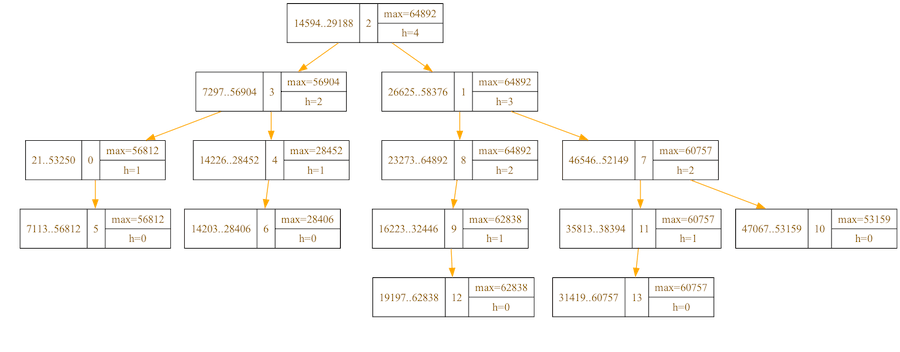3 releases (breaking)
| 0.3.0 | Feb 2, 2025 |
|---|---|
| 0.2.0 | Aug 17, 2024 |
| 0.1.0 | Jul 28, 2024 |
#212 in Data structures
2,176 downloads per month
Used in gen
81KB
1.5K
SLoC
Interavl
This crate implements an interval tree backed by an augmented, balanced binary search tree (an AVL tree - interavl - get it?!)

The IntervalTree maps half-open intervals to opaque values, and provides
efficient querying of all stored (interval, value) tuples that match a variety
of temporal relations described by Allen's interval algebra.
Use It
use interavl::IntervalTree;
// Initialise an empty tree.
let mut t = IntervalTree::default();
// Insert interval & value tuples into the tree.
//
// Intervals can be composed of any type that implements "Ord" such
// as timestamps, strings, etc.
t.insert(24..80, "Bob");
t.insert(10..100, "Doris");
t.insert(40..55, "Frank");
t.insert(100..400, "Nigel");
// Find which intervals overlap with a query interval:
for (interval, name) in t.iter_overlaps(&(42..50)) {
println!("{name} overlaps (matching interval is {interval:?})");
}
Performance
Lookup operations against an IntervalTree are fast, executing against
millions / billions of keys per second:
| Tree Size | Build Tree | Lookup Value | Stabbing Query |
|---|---|---|---|
| 100 tuples | 1.5µs | 6ns | 39ns |
| 1,000 tuples | 31µs | 8ns | 67ns |
| 10,000 tuples | 777us | 9ns | 115ns |
Interval stabbing and membership queries are particularly fast due to the use of subtree pruning to reduce the search space.[^filter-perf]
- Build Tree: insert the N keys listed into an empty tree (inclusive of random value generation)
- Lookup Value: find an interval in the tree and return the value for it
- Stabbing Query: yield all intervals that overlap with a given query interval
The above measurements capture the single-threaded performance of operations against a tree containing varying numbers of keys on a M1 MacBook Pro.
The benchmarks to generate these numbers are included in this repo (run cargo bench).
[^filter-perf]: Interval stabbing filters ~53 billion intervals per second.